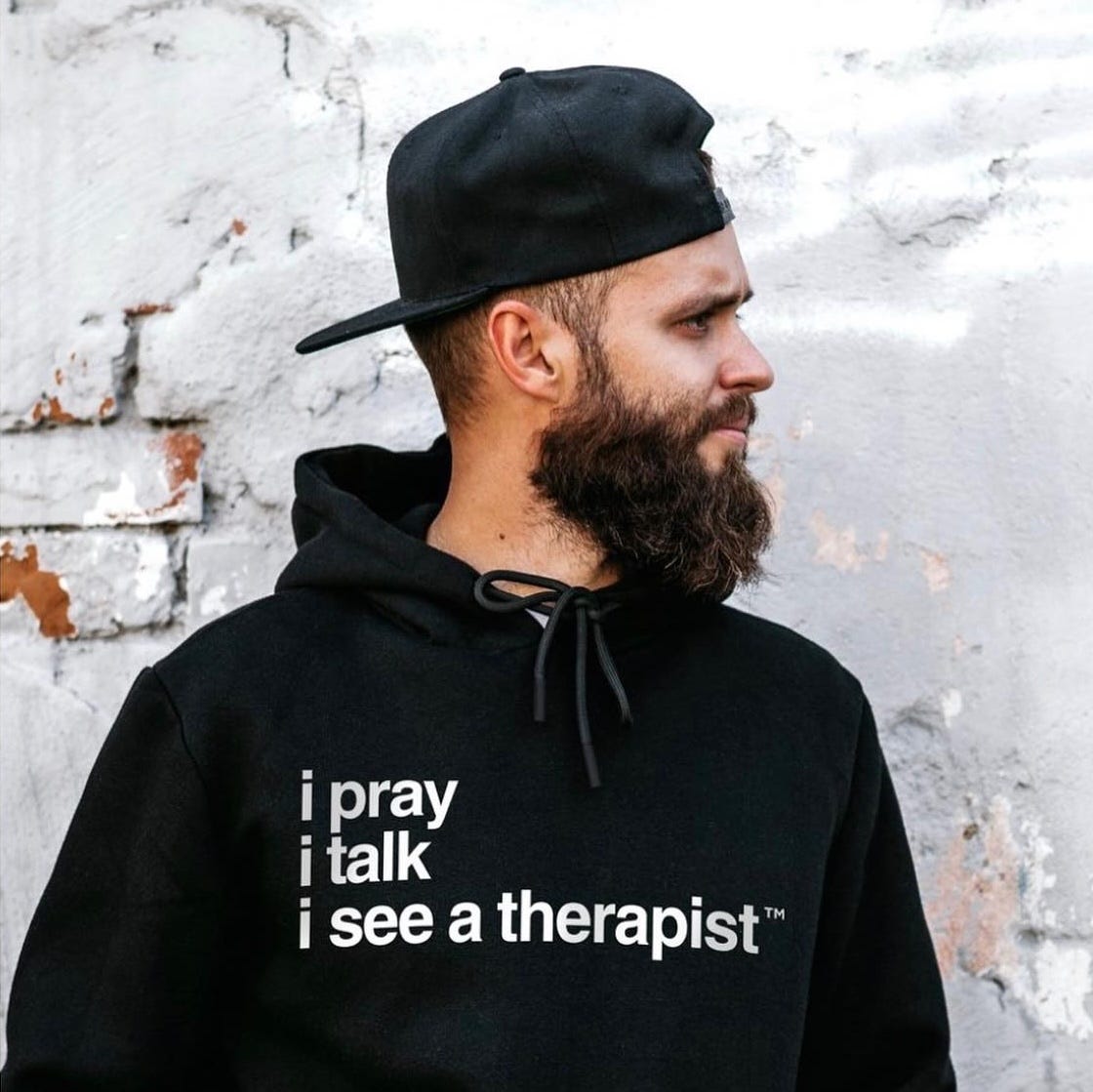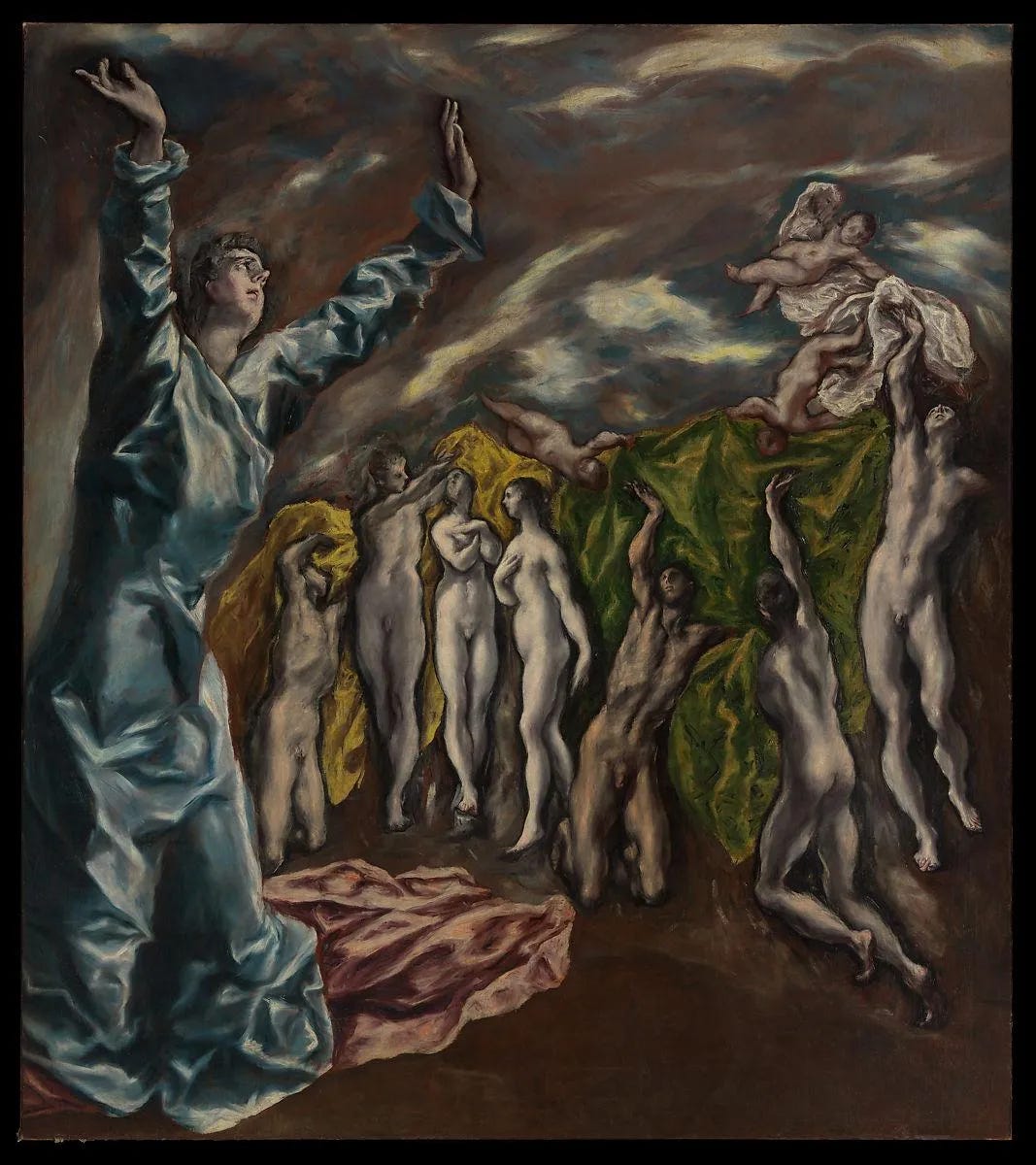Gen Z is Not Far from the Kingdom of God
One of the next generation's sharpest voices speaks out on issues Gen Z isn't supposed to care about. Christians ought to be paying attention.
Every once in a while, I come across an article that stops me in my tracks. This is one of those times.
While thumbing through my Substack feed recently, I came across an article by
, by way of a recommendation from . I thought the title was intriguing and had a break in my day, so I dove in. Since then, I’ve probably read it through ten times now.I honestly wish I could go back to reading it through the first time, because my initial experience was one of simultaneous exhilaration and disorientation. I just could not believe what I was reading.
According to the internet, Freya India is 24 years old, with an audience that far exceeds the readership of this newsletter (15k followers on Twitter/X, over 22k subscribers to her Substack newsletter
). Freya spends her time writing about technology and mental health, particularly as it affects the young women of today. But in this article, rather than guiding her readers through the rocky terrain of contemporary culture, Freya critiques the terrain itself: she points out that modern life still has a religious shape to it, even if many have come to view religious faith as archaic and uncouth.Normally, the only people I see talking about stuff like this are Christians (and maybe
, on occasion). As far as I can tell, Freya is not a Christian of any kind, which makes her meditations all the more intriguing to me. We are told Gen Z doesn’t care about religion, that the progressive shift of twenty-first century culture should be viewed a net positive in the development of human flourishing. Freya’s article not only refutes those claims, but testifies to the contrary: the next generation is actually deeply religious, but the hollowing out of traditional faith has left them with a secular creed that has no recourse but to put self at the center—even, as she mentions, if it means hurting others.My purpose in writing here is to show why Freya’s insights, which deserve their flowers many times over, ought to be met with joy and excitement by the people of God. Rightly understood, her words shine a light on the deep longings of our disenchanted age and provide us with a glimpse of hope as we seek to share the message of the Gospel in a new context for a new generation.
Our New, Broken Religion
Freya’s full article is worth reading, but I want to highlight a few sections for us to consider here. To start, Freya shows how Gen Z has been taught to interpret their lives using a therapeutic lens, where previous generations saw the world through the lens of religious faith. There’s just one catch: all the new strategies are nothing more than repackaged forms of old religious practices without the cultural baggage.
I don’t even think young people see this therapeutic worldview as a worldview anymore. It’s hard to overstate how much it shapes our understanding of ourselves and the world. This is how many of us make sense of loss, of love, of hurt now. We refract our relationships through therapy-speak. We define ourselves by our diagnoses. And we mimic religion, all the time. We don’t pray at night; we repeat positive affirmations. We don’t confess; we trauma dump. We don’t seek salvation; we go on healing journeys. We don’t resist temptation from the devil; we reframe intrusive thoughts. We don’t exorcise evil spirits; we release trauma. And of course we don’t talk to God, c’mon—we give a ‘specific request to the universe’ that ‘has a greater plan’ for us.
As the kids say these days: I feel seen.
Having worked in mental heath for most of my professional life, I’ve had a front row seat to the imprinting of therapeutic language onto our societal genetic code. If I’m being honest, there was probably even a time when I would have told you this was a good thing. Coming out of graduate school in 2012, going to therapy was still broadly considered a cultural taboo; if you had a therapist, you were thought to be someone with skeletons in your closet, someone to mark and avoid. Today, though, it’s a sign that you’re more mature, more wise, more honest than someone who doesn’t. Once, therapy was an intensely private affair; today, we advertise our therapy on t-shirts.1
This is fascinating stuff from Freya. Her direct parallels to our current climate are spot on: the confessional booth has become today’s counseling room, the classical spiritual disciplines our cognitive behavioral therapy, and honoring God the affirmations of self-love. Effectively, we’re still doing all the same things we used to do, just without the problematic parts like God, sin, etc. One might even say it seems like there’s nothing new under the sun.2
This next part is my favorite.
“It’s hard to put this into words but I think, in some ways, what we actually want is to be humbled. People say Gen Z follow these new faiths because we crave belonging and connection, but what if we also crave commandments? What if we are desperate to be delivered from something? To be at the mercy of something? I think we underestimate how hard it is for young people today to feel their way through life without moral guardrails and guidance, to follow the whims and wishes of our ego and be affirmed by adults every step of the way. I’m not sure that’s actual freedom. And if it is, I’m not sure freedom is what any of us actually wants…No I don’t want to treat marriage like an employment contract. I want to be bound more! Bound to people; bound to places; bound to right and wrong!” (emphasis mine)
To be abundantly clear: nobody, I mean nobody, talks like this.
Craving commandments? Desiring to be “bound more?” Go anywhere you like today, and you will hear just the opposite: that you and I are and should be free to do anything we like at any time, and nothing ought to be imposed on us except the mandate to never infringe upon someone else’s right to the very same thing. How can she possibly want to be at the mercy of something?
Freya has stumbled upon what C.S. Lewis once called “the Tao”: the rational and moral order of the universe present in all creation, something we cannot really get rid of no matter how hard we try.3 You can almost feel like something is drawing her in as you read that paragraph, something she cannot fully understand but something she knows is good. Her words here underscore the reality that God has truly made us for Himself, and ultimately our hearts are restless until we rest in Him. Without knowing it, Freya is unwittingly bearing witness to the goodness of God’s created order and the unique design embedded on her life.
“[It’s] worth wondering—when we’re downloading these mental health apps in our millions, repeating our positive affirmations, speaking in the language of salvation and higher powers—what we’re really drawn to here. Worth asking ourselves, at least, why we mocked religion only to mimic it. And why what we’re doing isn’t working.
What we need most in a rapidly changing world is rootedness. Could just be me but when I listen to the misery and confusion of my generation beneath it I hear a heartbreaking need—a need to be bound to others, to a community, to a moral code, to something more. This is not enough.”
If I could sum up the existential burdens of Gen Z in one question, it would be this: “Who am I, and where do I belong?”
The question necessarily has two stems, because having one answer without the other is inconclusive; both are required. Therapeutic culture tries to answer those questions, which is how you get teenagers who say “I’m a cutter, and my friends all cut themselves too”: diagnosis and community, all rolled into one. This is why Freya rightly emphasizes the need for rootedness: without it, young people are reduced to little more than autonomous buoys adrift in a sea of madness and meaninglessness.
Something No Longer There
Reading through Freya’s article, I was reminded of a story I once heard
tell.4 In the Metropolitan Museum of Art in New York City, you will find a remarkable painting by El Greco called “The Vision of St. John.” The painting depicts the opening of the Fifth Seal from the book of Revelation, where martyrs who gave their lives for the Gospel receive their gifts of white robes at the end of time. But as it turns out, the painting as we know it is actually incomplete: during a restoration during the 1880’s, someone elected to cut off almost six feet worth of canvas from the top of the painting in an effort to “improve” it, leaving just a fragment of what was originally there. I’ll let Dr. Smith take it from here:“And so, in what seems a fitting parable of modernity, the exultant arms of John the Revelator reach upward to—nothing: to the top of the frame, to the edge of the canvas. The martyrs seem to receive gifts from nowhere, and John seems to praise the nonexistent. All of them seem to look for something no longer there.”
The story of this painting gives us a picture of what life in our disenchanted age is like. Even after we’ve banished God from our modern imagination, we still feel compelled to worship, to venerate, to seek meaning and purpose beyond the frame of our temporal lives. But without God there to tell us who we are and how we ought to live, we’ve resorted to copying all His ideas and inserting ourselves as God instead. But you and I were never meant to be God, nor are we capable of self-illuminating the darkness found in our hearts. And without a transcendent reality to beckon us, our ephemeral lives are as incomplete as El Greco’s painting. This incompleteness is something Gen Z is slowly becoming aware of.
The British author Julian Barnes once said it this way: “I don’t believe in God, but I miss Him.” I think many today would resonate with the deep longing, the yearning5 even, in those words. And interestingly, I believe this reality presents Christians with a unique opportunity to capitalize on.
A Surprising Truth
So what does any of this mean to the Christian? Why should we be interested in Freya’s words here?
Despite what you and I may have heard about Gen Z and the future of faith in the West, Freya’s article pulls back the curtain to reveal a surprising truth: that Gen Z is in fact not a post-Christian generation, but pre-Christian.
Unlike their Gen X or Millennial counterparts, Zoomers have arrived on the scene without many of the recurring biases, pain points, and subsequent defensive posture that has come to define previous generation’s experiences with faith. As it pertains to classical Christianity, Gen Z is something more like a blank slate than we have seen previously; in fact, the kids of today are more likely to not know who Jesus is than any other generation before them. You may be tempted to see that as discouraging, but consider again that Gen Z has already adopted religious-like/religious-adjacent activities into its greater worldview. This means the intellectual and emotional scaffolding needed to construct a robust faith system likely already exists in the young person’s mind. This should give us cause to rejoice, because it means Gen Z is potentially far more ready to respond to the truth of the Gospel than you and I have been led to believe. We can use this to introduce them to Christ by engaging them on the quasi-religious activities that already fill their lives. Then, when the time is right, we can connect the dots for them from behavior modification to repentance, from shame to sin, from the DSM-5 to the living Word of God, from the trauma of past hurt to the red cross of Calvary.
Above all, do not be coaxed into believing the children and young adults in your life are not asking the big questions about the world. They are. And whether you know it or not, any time they are pulled into your orbit, they are asking these question of you.
“Who am I? Where do I belong?”
When we see others like Freya happen upon truth that’s rooted in creation, truths about God, life and purpose, we can and should be ready to come alongside them and say, just as Jesus said to the scribe in Mark 12, “You are not far from the kingdom of God.”
I don’t mean this as a troll job. But I do think it’s interesting to track how far the pendulum has swung on this issue. This is especially true with regard to how therapy is perceived in religious communities. In the past 20 years, we’ve gone from hiding a need for therapy in the church to repurposing it as a new level of spiritual maturity, to the point people feel compelled to broadcast their therapy everywhere they go. That’s as close to a total-180 as you get.
“What has been is what will be, and what has been done is what will be done, and there is nothing new under the sun.” ~Ecclesiastes 1:9, ESV
The full article (or better yet, this lecture) is really thought-provoking if you’re as into this stuff as I am.







Yes! A few years back, I ended up spending a month with Gen Zers while walking the Camino de Santiago. Given the context, religion was on the table for discussion. I found that overall Gen Zer's, because they grew up without religion, they never had a bad experience with religion. So, they were curious about Christianity - not judgmental (like a lot of secular Gen X and older millennials). They were like "Yeah, but what do you "do" at church each week?" or "What's the deal with Jesus? Why is he significant?" I guess I was expecting hostility towards religion because I'm so used to talking to Gen X/millennials so I was surprised to get such a different reaction from Gen Z.
Freya is only 24? She’s not a Christian?! You’re blowing my mind here. I’ve been reading her thinking she probably had theological background. She is wise beyond her years and has a prophetic edge.
Great essay here. Gen Z is not far at all. …And they also are stuck. We need to talk about the pseudo-virtues that keep kids just on the borderlands of kingdom life.